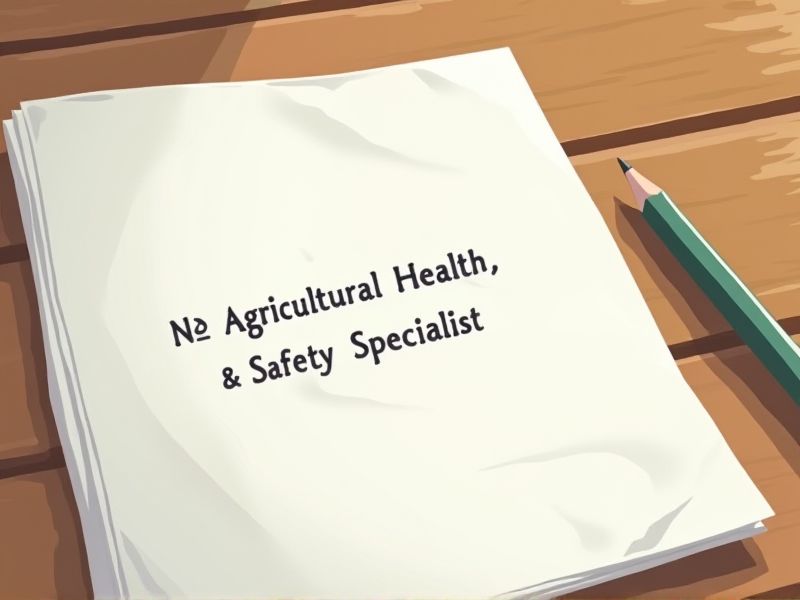
Agricultural Health and Safety Specialists focus on minimizing risks and promoting safe practices in farming environments, directly impacting worker well-being and productivity. Certifications ensure specialists possess the necessary knowledge to identify hazards, institute preventive measures, and comply with regulatory standards. They also provide credibility and enhance the trust of employers and communities in implementing safety protocols. Important certifications relevant for an Agricultural Health and Safety Specialist include the following.
Certified Safety Professional (CSP)
A Certified Safety Professional (CSP) provides agricultural health and safety specialists with a recognized benchmark of expertise and competence in managing workplace safety risks. The intricacies of agricultural environments pose unique hazards, and a CSP credential ensures these specialists are well-equipped to design and implement effective safety protocols. With a CSP, specialists gain access to ongoing professional development opportunities, crucial for staying updated with evolving safety regulations and practices. Employers in agriculture often trust CSP-certified professionals more, as the certification indicates a commitment to maintaining high safety standards and reducing operational risks.
Associate Safety Professional (ASP)
An Associate Safety Professional (ASP) is needed for an Agricultural Health and Safety Specialist because they bring a comprehensive understanding of safety regulations and standards that are crucial in minimizing agricultural workplace hazards. Their expertise helps in developing and implementing effective safety programs tailored to the specific needs of agricultural environments, thereby preventing accidents and ensuring compliance with occupational safety laws. ASPs provide skilled assessments that identify potential risks, facilitating a proactive approach to managing health and safety concerns within agricultural settings. They also play a vital role in educating workers about safe practices, thereby enhancing overall workplace safety culture.
Certified Industrial Hygienist (CIH)
A Certified Industrial Hygienist (CIH) is needed for an Agricultural Health and Safety Specialist because they provide expert assessment of exposure risks to pesticides and other hazardous substances common in agriculture. CIHs develop and implement safety protocols to prevent illnesses and injuries among farm workers, directly impacting overall workplace safety and reducing accidents. Their expertise ensures compliance with regulatory standards, which is crucial for avoiding legal and financial penalties in the agricultural sector. The focus on monitoring environmental conditions guarantees sustainable agricultural practices, protecting both workers and the environment.
Occupational Health and Safety Technologist (OHST)
The presence of an Occupational Health and Safety Technologist (OHST) enhances risk assessment capabilities, which leads to reduced accidents in agricultural environments. OHSTs provide expertise in regulatory compliance, helping farms avoid costly fines and legal issues. Their skills in data analysis improve the tracking of incidents, allowing for more targeted safety interventions. By developing and implementing safety programs, OHSTs contribute to healthier work conditions, increasing productivity and worker morale.
OSHA 10-Hour Certification
The OSHA 10-Hour Certification provides Agricultural Health and Safety Specialists with foundational knowledge of workplace safety standards, crucial for identifying and mitigating hazards in agricultural settings. By understanding OSHA regulations, these specialists can implement effective safety protocols, reducing the likelihood of accidents and injuries. The certification training enhances their ability to educate workers on safety practices, promoting a culture of safety compliance. Employers often require this certification as proof that safety specialists are equipped to handle the unique challenges present in agricultural environments.
HAZWOPER Certification
Agricultural Health and Safety Specialists often handle hazardous substances like pesticides and fertilizers, which can pose significant risks if not managed properly. HAZWOPER Certification provides essential training on handling, storing, and disposing of these hazardous materials safely, reducing occupational health risks. This certification ensures compliance with OSHA standards, minimizing legal liabilities for employers. Training equips specialists with the skills to respond to emergencies involving chemical spills or exposure, thereby protecting both workers and the environment.
First Aid/CPR/AED Certification
The agricultural environment presents high-risk scenarios where emergencies like cardiac arrest or severe injuries may occur, necessitating prompt response. Possessing First Aid/CPR/AED certification equips specialists with life-saving skills to effectively handle such emergencies, potentially reducing fatality rates. Knowing CPR and AED use ensures timely intervention when dealing with common farm accidents, aligning with safety regulations. Certified specialists contribute to a safer work site, enhancing the overall health and safety protocols in agricultural settings.
Certified Professional in Erosion and Sediment Control (CPESC)
Agricultural Health and Safety Specialists often deal with maintaining soil integrity, where erosion and sediment control are crucial issues. A Certified Professional in Erosion and Sediment Control (CPESC) ensures that effective strategies are in place to prevent soil degradation, which leads to enhanced crop yields and sustainable farming practices. Expertise from CPESC helps in minimizing environmental hazards related to sediment runoff, thus promoting safer working environments for farm workers. Regulatory compliance is increasingly stringent in agricultural sectors, requiring specialized knowledge from certifications like CPESC to meet environmental standards.
Incident Command System (ICS) Certification
The Incident Command System (ICS) Certification enhances an Agricultural Health and Safety Specialist's capability to manage and coordinate emergency responses effectively. This certification ensures that specialists can integrate seamlessly into multi-agency operations, crucial during agricultural accidents or natural disasters affecting food supply chains. It also equips them with standardized communication skills to convey critical safety information and strategies efficiently. The training aids in minimizing risks and health hazards, thereby improving overall safety outcomes in agricultural settings.
Confined Space Entry Certification
Confined Space Entry Certification is essential for Agricultural Health and Safety Specialists because it ensures they understand the dangers associated with limited ventilation areas like grain bins and silos. These spaces hold risks of toxic gas accumulation or oxygen deficiency, which could lead to asphyxiation. Proper certification equips specialists with the knowledge to assess and mitigate these hazards effectively. Having certified personnel can reduce accident rates and improve compliance with occupational safety regulations.
Summary
You can expect enhanced expertise in risk management when an Agricultural Health and Safety Specialist holds certifications. This improvement correlates to a decrease in workplace accidents and injuries. Certified specialists often implement more efficient safety protocols. Subsequent regulatory compliance boosts worker confidence and operational productivity.
